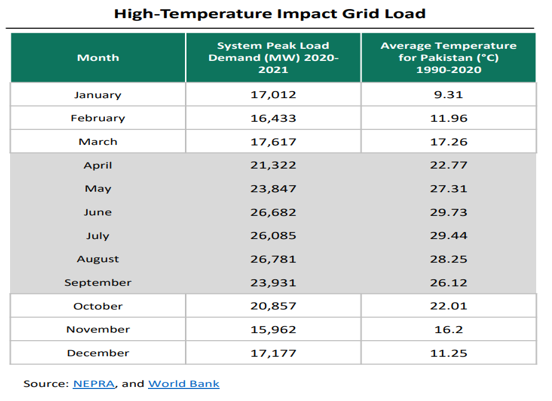INP-WealthPk
Qudsia Bano
The energy sector is a significant contributor to climate change as rising temperatures are increasing the demand for more energy to be produced for cooling, thus further intensifying the climate change effects.
Rapid population growth and resultant economic expansion continue to raise energy demand, leading to an increase in greenhouse gas (GHG) emissions as electricity is mostly produced by carbon-emitting fuels.
According to a recent report of KTrade Securities on climate change, Pakistan's electricity usage is closely correlated with the outside temperature. Higher temperatures typically result in greater demand for power.

The report compares the monthly temperature trend and the monthly demand for power in the table above. This information makes it clear that there is a pronounced increase in demand for electricity during high-temperature months. According to research, a rise in the ambient temperature of one degree might cause an increase in electricity demand of 0.5% to 8.5%. The demand-driven increase in the need for air cooling by homes and businesses is the cause of this rise in electricity consumption.
Pakistan is experiencing an increase in average temperatures that are much higher than the global norm, according to a recent World Bank research. Fahim Ashraf, executive member of Pakistan Solar Association, told WealthPK during a discussion that Pakistan is one of the nations most susceptible to the negative effects of air pollution and climate change. “As a developing country, Pakistan is obligated to consume more energy to provide better living conditions for its people.”
He said it is crucial for Pakistan to quickly switch from highly polluting fossil fuels to clean forms of energy to support global efforts to reduce GHG emissions and to protect public health by easing the burden of air pollution within the country. According to Fahim, the infrastructure and methods for producing and moving energy will be negatively impacted by climate change.
Extreme weather events that affect both offshore and onshore facilities are projected to cause more disruption and production shutdowns in the oil and gas industry, he pointed out. Fahim said the extreme weather conditions and rising sea levels will have an impact on power plants, particularly those in coastal areas. “Critical energy transportation infrastructure is in jeopardy due to the thawing of permafrost in cold climes and the impact of increasing sea levels on oil and gas pipelines in coastal areas.”
The energy expert stressed that storms will influence power grids, and in some places, the rise in global temperature may have an impact on electricity generation, particularly thermal and hydroelectric plants. “Bioenergy crops may potentially be impacted by weather variations. The industry can generally adjust to climatic changes, although doing so will probably cost huge money.”
Credit : Independent News Pakistan-WealthPk



